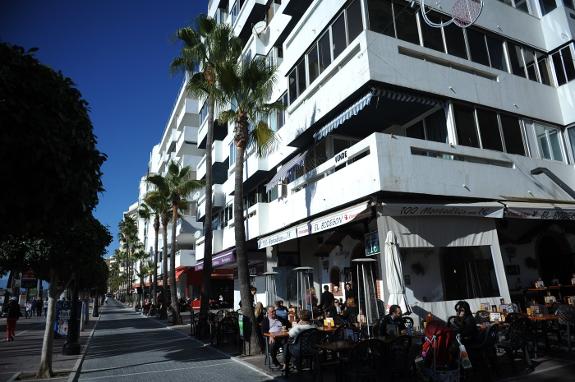Communities of owners are starting to ban or restrict holiday lets in apartment blocks
The rule can't be backdated, but it allows neighbours to vote to increase community fees by up to 20% on holiday lets
JUAN SOTO
Viernes, 2 de agosto 2019, 13:07
The sound of suitcases being pulled along, loud music and conversations in the early hours have become normal for María Ángeles Sicilia and her neighbours. They live in Calle Ollerías in Malaga city, and for more than two years several apartments in their block have been used for holiday lets. They say they find it hard to sleep because of the disturbance.
Although the new law has only been in force for a short time, it has come as a huge relief for communities of owners in Malaga province. Community management agents say they are overwhelmed with requests for information and are currently holding two or three meetings a week about the situation. Francisco González Palma, a legal advisor at the Colegio de Administradores de Fincas, the provincial body overseeing management agents, says "a lot of people are worried and all the communities want to limit the number of holiday properties to avoid problems in the future".
Although the new regulations cannot be applied retroactively - properties which were already registered for tourism with the Junta de Andalucía can continue to be rented for holidays - they do provide a series of tools to prevent any more being used for this purpose and it is also possible to charge the owners extra fees or to increase their share of communal expenses by up to 20 per cent. For any of these measures to be approved, three-fifths of the owners must vote in favour.
Community administrators say owners of apartments in Malaga city centre and the nearby districts of Carretera de Cádiz, Paseo Marítimo, La Malagueta and even Teatinos have been the first to take action. Emilio Raya Castillo has already organised restrictions on holiday lets in two blocks in the historic city centre and on the seafront.
Bans have included holiday lets on certain floors and the use of communal facilities
-
The increase in the number of apartments which are being used for holiday lets in Malaga has exercised the ingenuity of many communities of owners who want to restrict this type of tourism as much as possible. Potential loopholes in the new law, which does not make it clear whether holiday lets can be banned completely or only restricted, has led to some owners taking extreme measures, including banning holiday clients from using communal facilities and smoking.
-
Francisco González Palma, a legal advisor at the Colegio de Administradores de Fincas, says every community is different and has its own problems and proposals. In some, he says, they want to stop apartments being used for holiday lets on certain floors of the block, or stop these clients using the swimming pool or communal washing lines.
-
Francisco, who gave a talk on the new law to a large audience at the College last week, believes many of the measures which are being put into force by communities of owners could be thrown out by the courts on the grounds that they are not legal.
-
He says it is vital to study any type of potential ban in detail, and provide full information and evidence. "For example, it won't be enough if there has only been an occasional problem with a visitor," he stresses.
"The new law came into force with immediate effect, but there are still some uncertainties over whether the law allows a total ban on apartments being used for holiday lets or only a restriction on numbers, whether it can be applied all year round, and whether it has to apply to the entire building or can be restricted to certain floors," he says. One of these cases has already been validated by the Malaga Property Registry. "The owners were very concerned about the problem and wanted to take action as soon as possible," he explains.
Change in the rules
It is now easier to regulate properties which are used for tourism than it was a few months ago, because originally every owner in a community had to agree. Now, a majority of three-fifths is deemed sufficient, although every owner has to take part in the vote. If some fail to attend the meeting, the management agent has to contact them to explain the situation and ask whether they agree with or reject the proposal.
The provincial delegate of the College of Property Registrars, María García, admits that there are still doubts and unknown aspects about the new Royal decree. The fact that it has only been in force for a short time and the number of people who are keen to restrict holiday lets in their apartment blocks has led to numerous enquiries.
"Many communities don't know how to register the restriction, what it involves or how much it is going to cost the owners," she says.
The head of the Colegio de Administradores de Fincas, Alejandro Pestaña, is aware of at least seven blocks in Malaga city where holiday lets have been restricted. Although he points out that this type of tourism can be positive for the city, he is aware that it can also cause problems such as noise, excessive use of communal facilities and a lack of security because doors are always open. "It is not up to us to make judgements, we have to enact the will of the residential blocks," he says.
Pestaña says there are still unanswered questions and he believes the government should clarify the situation before it is too late. "There are doubts to clear up, for example whether a property which was already registered is now liable to pay the extra charge or not," he explains.
